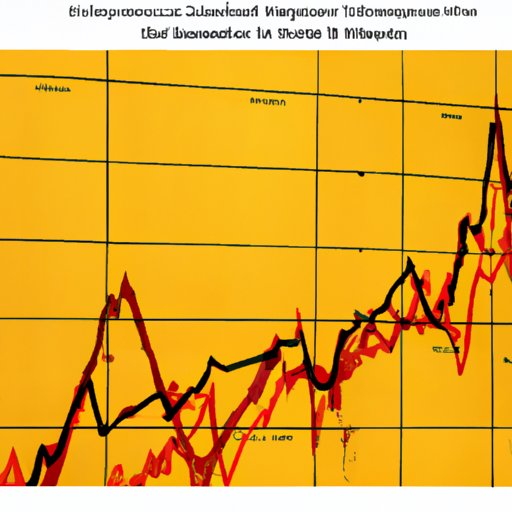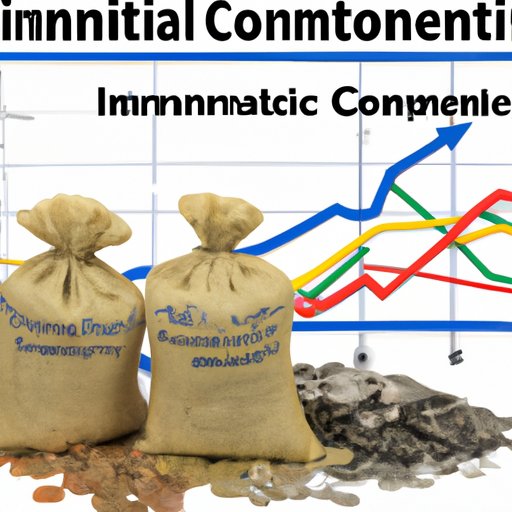Introduction
Inflation is an economic condition caused by an increase in the money supply or a decrease in purchasing power. It is typically measured as an annual percentage increase in the cost of goods and services. When inflation rises, the value of money falls, making it more difficult to purchase items with the same amount of money. As a result, investors must be aware of the potential impacts of inflation on their investments.
Inflation can have a significant effect on different types of investments, so it is important for investors to understand the different options available to them and how each one could be affected by inflation. This article will explore the different types of investments that are considered good investments during inflation, including gold, real estate, bonds, stocks, and commodities. The advantages and disadvantages of each type of investment will also be discussed.

Highlighting the Benefits of Investing in Gold During Inflation
Gold has long been seen as a safe-haven asset during times of economic uncertainty, and investing in gold during periods of inflation can be a smart move for investors. Gold tends to rise in price when inflation is high, as investors look for ways to protect their wealth against the devaluation of currency.
The main advantage of investing in gold during periods of inflation is that it is relatively easy to buy and sell. Investors can purchase gold coins or bars from local dealers or online, and they can store their gold in a secure location such as a bank vault or home safe. Gold is also liquid, meaning that it can be easily converted into cash if needed.
However, there are some factors to consider when investing in gold. For example, gold prices are volatile and can fluctuate significantly, so investors need to be aware of the risks associated with this type of investment. Additionally, gold is not a dividend-paying asset, so investors will not receive any income from their investments.
Exploring the Advantages of Investing in Real Estate During Inflation
Real estate is another option for investors looking for a safe-haven asset during times of inflation. Real estate values tend to remain stable during periods of high inflation, as investors seek out assets that offer stability and security. Additionally, real estate investments can provide investors with a steady stream of rental income, which can be used to offset the effects of inflation.
Investing in real estate during periods of inflation also offers other benefits. For example, real estate can be leveraged, meaning that investors can borrow money to purchase additional properties. Additionally, real estate investments can appreciate over time, providing investors with the potential for long-term capital gains.
However, there are some risks associated with investing in real estate during inflation. For example, real estate prices can be volatile, and there may be times when the market is not favorable for buyers. Additionally, real estate investments require a significant amount of capital, and investors may need to take on additional debt in order to finance their purchases.
Examining the Pros and Cons of Investing in Bonds During Inflation
Bonds are another popular investment option during periods of inflation. Bonds are debt instruments that are issued by governments or corporations and promise to pay a fixed rate of interest over a specific period of time. Bonds are generally considered to be low risk investments, as they provide investors with a guaranteed return of principal plus interest.
The main advantage of investing in bonds during periods of inflation is that they provide investors with a consistent stream of income. Additionally, bonds are considered to be relatively low risk investments, as they are backed by the issuing government or corporation. Finally, bonds can be purchased at a variety of maturities, allowing investors to tailor their investments to meet their individual needs.
However, there are some drawbacks to investing in bonds during periods of inflation. For example, bond yields tend to move in the opposite direction of inflation, meaning that investors may experience losses if inflation rises faster than expected. Additionally, bonds are not suitable for short-term investments, as they are subject to interest rate changes.

Evaluating the Potential Returns of Investing in Stocks During Inflation
Stocks can also be a good investment during periods of inflation. Stocks represent ownership in a company, and their prices can rise or fall depending on the performance of the underlying business. Stocks can provide investors with the potential for long-term capital appreciation, as well as dividend payments.
The main advantage of investing in stocks during periods of inflation is that they have the potential to generate higher returns than other investments. Additionally, stocks can provide investors with exposure to different sectors and industries, allowing them to diversify their portfolios. Finally, stocks are relatively liquid, meaning that investors can easily buy and sell them as needed.
However, there are some risks associated with investing in stocks during periods of inflation. For example, stock prices can be volatile, and investors may experience losses if the underlying company performs poorly. Additionally, stocks do not offer a guaranteed return of principal, so investors should be aware of the risks involved before investing.

Analyzing the Impact of Investing in Commodities During Inflation
Commodities are another investment option during periods of inflation. Commodities are physical goods that are used in the production of other products or traded as investments. Examples of commodities include oil, gold, and silver. Commodities can provide investors with the potential for long-term capital appreciation, as well as income from dividends.
The main advantage of investing in commodities during periods of inflation is that they can provide investors with exposure to different markets and sectors. Additionally, commodities are generally less volatile than stocks, making them a safer bet during times of economic uncertainty. Finally, commodities can be leveraged, allowing investors to increase their exposure without taking on additional risk.
However, there are some drawbacks to investing in commodities during periods of inflation. For example, commodities are subject to supply and demand, so their prices can be unpredictable. Additionally, commodities can be difficult to store and transport, making them less liquid than other investments.
Conclusion
Inflation can have a significant effect on different types of investments, so it is important for investors to understand the different options available to them and how each one could be affected by inflation. This article explored the different types of investments that are considered good investments during inflation, including gold, real estate, bonds, stocks, and commodities. The advantages and disadvantages of each type of investment were also discussed.
Overall, the best investment option during periods of inflation will depend on the individual investor’s goals and risk tolerance. It is important for investors to conduct research and weigh the pros and cons of each option before making any decisions. With the right strategy and careful consideration, investors can make informed decisions and potentially achieve their desired returns despite the impacts of inflation.
(Note: Is this article not meeting your expectations? Do you have knowledge or insights to share? Unlock new opportunities and expand your reach by joining our authors team. Click Registration to join us and share your expertise with our readers.)
